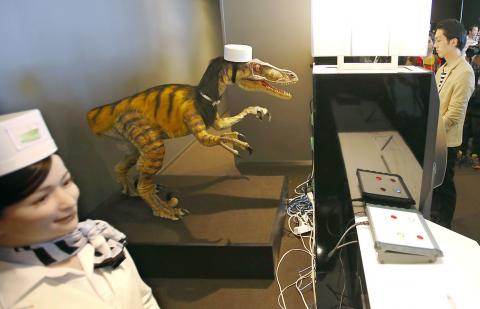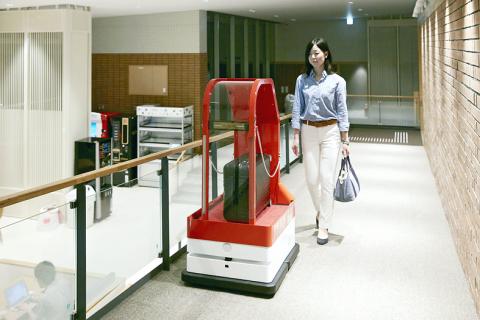The English-speaking receptionist is a vicious-looking dinosaur, and the one speaking Japanese is a female humanoid with blinking lashes.
“If you want to check in, push one,” the dinosaur says.
The visitor punches a button on the desk, and types in information on a touch panel screen.

Photo: AP
From the front desk to the porter, which is an automated trolley taking luggage up to the room, this hotel in southwestern Japan, aptly called Weird Hotel, is “manned” almost totally by robots to save labor costs.
Hideo Sawada, who runs the hotel as part of an amusement park, says using robots is not a gimmick, but a serious effort to utilize technology and achieve efficiency.
Henn-na Hotel, as it is called in Japanese, was shown to reporters on Wednesday, complete with robot demonstrations, ahead of its opening to the public on Friday.

Photo: EPA
Another feature of the hotel is the use of facial-recognition technology, instead of the standard electronic keys, by registering the digital image of the guest’s face during check-in.
The reason? Robots are not good at finding keys, if people happen to lose them.
A giant robotic arm, usually seen in manufacturing, is encased in glass quarters in the corner of the lobby. It lifts one of the boxes stacked into the wall and puts it out through a space in the glass, where a guest can place an item in it, to use as a locker.
The arm will put the box back into the wall, until the guest wants it again. The system is called “robot cloak room.”
Why a simple coin locker will not suffice is beside the point.
“I wanted to highlight innovation,” Sawada told reporters. “I also wanted to do something about hotel prices going up.”
Staying at Henn na Hotel starts at ¥9,000 (US$80), a bargain for Japan, where a stay in one of the nicer hotels can easily cost twice or three times that much.
The concierge is a doll-like hairless robot with voice recognition that prattles breakfast and event information. It cannot call a cab or do other errands.
Japan is a world leader in robotics technology, and the government is trumpeting robotics as a pillar of its growth strategy. Robots have long been used there in manufacturing. However, interest is also high in exploring the potential of robots in human interaction, including helping care for the elderly.
Robotics is also key in the decommissioning of the three reactors at the Fukushima Dai-ichi nuclear power plant, which went into meltdown in 2011, in the worst nuclear catastrophe since Chernobyl.
One area for which the Henn-na Hotel still relies on human beings is security.
The place is dotted with security cameras, and real people are watching everything through a monitor to make sure guests stay safe and no one makes off with one of the expensive robots.
“And they still can’t make beds,” said Sawada, who has also engineered the rise of a popular affordable Japanese travel agency.
He has big ambitions for his robot hotel concept and wants to open another one soon in Japan, and later abroad. He is also eager to add other languages, such as Chinese and Korean, to the robots’ vocabulary.
A block-shaped robot that was scuttling around in the lobby had been brought in to do room service, delivering beverages and simple snacks, but it was not ready to do that yet.
Outdoors, Sawada also demonstrated a drone that flew in to deliver a few small jars filled with snacks. He said he wanted to eventually have drones perform in shows for guests.
In the hotel’s rooms, a lamp-size robot in the shape of a fat pink tulip called Tuly answers simple questions like: “What time is it?” and “What is the weather tomorrow?”
You can also tell it to turn the room lights on or off. There are no switches on the walls.
Sawada is keeping the hotel half-filled for the first few weeks to make sure nothing goes wrong.
He also canceled at the last minute the overnight stay planned for media. The robots simply were not ready.

Taiwan will prioritize the development of silicon photonics by taking advantage of its strength in the semiconductor industry to build another shield to protect the local economy, National Development Council (NDC) Minister Paul Liu (劉鏡清) said yesterday. Speaking at a meeting of the legislature’s Economics Committee, Liu said Taiwan already has the artificial intelligence (AI) industry as a shield, after the semiconductor industry, to safeguard the country, and is looking at new unique fields to build more economic shields. While Taiwan will further strengthen its existing shields, over the longer term, the country is determined to focus on such potential segments as

UNCERTAINTY: Innolux activated a stringent supply chain management mechanism, as it did during the COVID-19 pandemic, to ensure optimal inventory levels for customers Flat-panel display makers AUO Corp (友達) and Innolux Corp (群創) yesterday said that about 12 to 20 percent of their display business is at risk of potential US tariffs and that they would relocate production or shipment destinations to mitigate the levies’ effects. US tariffs would have a direct impact of US$200 million on AUO’s revenue, company chairman Paul Peng (彭雙浪) told reporters on the sidelines of the Touch Taiwan trade show in Taipei yesterday. That would make up about 12 percent of the company’s overall revenue. To cope with the tariff uncertainty, AUO plans to allocate its production to manufacturing facilities in

COLLABORATION: Given Taiwan’s key position in global supply chains, the US firm is discussing strategies with local partners and clients to deal with global uncertainties Advanced Micro Devices Inc (AMD) yesterday said it is meeting with local ecosystem partners, including Taiwan Semiconductor Manufacturing Co (TSMC, 台積電), to discuss strategies, including long-term manufacturing, to navigate uncertainties such as US tariffs, as Taiwan occupies an important position in global supply chains. AMD chief executive officer Lisa Su (蘇姿丰) told reporters that Taiwan is an important part of the chip designer’s ecosystem and she is discussing with partners and customers in Taiwan to forge strong collaborations on different areas during this critical period. AMD has just become the first artificial-intelligence (AI) server chip customer of TSMC to utilize its advanced

Chizuko Kimura has become the first female sushi chef in the world to win a Michelin star, fulfilling a promise she made to her dying husband to continue his legacy. The 54-year-old Japanese chef regained the Michelin star her late husband, Shunei Kimura, won three years ago for their Sushi Shunei restaurant in Paris. For Shunei Kimura, the star was a dream come true. However, the joy was short-lived. He died from cancer just three months later in June 2022. He was 65. The following year, the restaurant in the heart of Montmartre lost its star rating. Chizuko Kimura insisted that the new star is still down